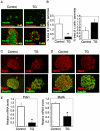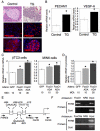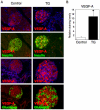FoxO1 gain of function in the pancreas causes glucose intolerance, polycystic pancreas, and islet hypervascularization
- PMID: 22384192
- PMCID: PMC3285669
- DOI: 10.1371/journal.pone.0032249
FoxO1 gain of function in the pancreas causes glucose intolerance, polycystic pancreas, and islet hypervascularization
Abstract
Genetic studies revealed that the ablation of insulin/IGF-1 signaling in the pancreas causes diabetes. FoxO1 is a downstream transcription factor of insulin/IGF-1 signaling. We previously reported that FoxO1 haploinsufficiency restored β cell mass and rescued diabetes in IRS2 knockout mice. However, it is still unclear whether FoxO1 dysregulation in the pancreas could be the cause of diabetes. To test this hypothesis, we generated transgenic mice overexpressing constitutively active FoxO1 specifically in the pancreas (TG). TG mice had impaired glucose tolerance and some of them indeed developed diabetes due to the reduction of β cell mass, which is associated with decreased Pdx1 and MafA in β cells. We also observed increased proliferation of pancreatic duct epithelial cells in TG mice and some mice developed a polycystic pancreas as they aged. Furthermore, TG mice exhibited islet hypervascularities due to increased VEGF-A expression in β cells. We found FoxO1 binds to the VEGF-A promoter and regulates VEGF-A transcription in β cells. We propose that dysregulation of FoxO1 activity in the pancreas could account for the development of diabetes and pancreatic cysts.
Conflict of interest statement
Figures






Similar articles
-
The forkhead transcription factor Foxo1 links insulin signaling to Pdx1 regulation of pancreatic beta cell growth.J Clin Invest. 2002 Dec;110(12):1839-47. doi: 10.1172/JCI16857. J Clin Invest. 2002. PMID: 12488434 Free PMC article.
-
FoxO1 as a double-edged sword in the pancreas: analysis of pancreas- and β-cell-specific FoxO1 knockout mice.Am J Physiol Endocrinol Metab. 2012 Mar 1;302(5):E603-13. doi: 10.1152/ajpendo.00469.2011. Epub 2012 Jan 3. Am J Physiol Endocrinol Metab. 2012. PMID: 22215655
-
Overexpression of FoxO1 in the hypothalamus and pancreas causes obesity and glucose intolerance.Endocrinology. 2012 Feb;153(2):659-71. doi: 10.1210/en.2011-1635. Epub 2011 Dec 20. Endocrinology. 2012. PMID: 22186407
-
Regulation of pancreatic beta-cell function by the forkhead protein FoxO1.Diabetes Obes Metab. 2007 Nov;9 Suppl 2:140-6. doi: 10.1111/j.1463-1326.2007.00782.x. Diabetes Obes Metab. 2007. PMID: 17919188 Review.
-
PDX1, Neurogenin-3, and MAFA: critical transcription regulators for beta cell development and regeneration.Stem Cell Res Ther. 2017 Nov 2;8(1):240. doi: 10.1186/s13287-017-0694-z. Stem Cell Res Ther. 2017. PMID: 29096722 Free PMC article. Review.
Cited by
-
Notch-mediated Ephrin signaling disrupts islet architecture and β cell function.JCI Insight. 2022 Mar 22;7(6):e157694. doi: 10.1172/jci.insight.157694. JCI Insight. 2022. PMID: 35167496 Free PMC article.
-
Regulation of Pdx1 by oxidative stress and Nrf2 in pancreatic beta-cells.Front Endocrinol (Lausanne). 2022 Sep 15;13:1011187. doi: 10.3389/fendo.2022.1011187. eCollection 2022. Front Endocrinol (Lausanne). 2022. PMID: 36187092 Free PMC article. Review.
-
Protective effects of curcumin on desipramine-induced islet β-cell damage via AKAP150/PKA/PP2B complex.Acta Pharmacol Sin. 2024 Feb;45(2):327-338. doi: 10.1038/s41401-023-01176-6. Epub 2023 Oct 16. Acta Pharmacol Sin. 2024. PMID: 37845344 Free PMC article.
-
FoxO1 Plays an Important Role in Regulating β-Cell Compensation for Insulin Resistance in Male Mice.Endocrinology. 2016 Mar;157(3):1055-70. doi: 10.1210/en.2015-1852. Epub 2016 Jan 4. Endocrinology. 2016. PMID: 26727107 Free PMC article.
-
Levothyroxine enhances glucose clearance and blunts the onset of experimental type 1 diabetes mellitus in mice.Br J Pharmacol. 2017 Nov;174(21):3795-3810. doi: 10.1111/bph.13975. Epub 2017 Sep 20. Br J Pharmacol. 2017. PMID: 28800677 Free PMC article.
References
-
- Kulkarni RN, Bruning JC, Winnay JN, Postic C, Magnuson MA, et al. Tissue-specific knockout of the insulin receptor in pancreatic beta cells creates an insulin secretory defect similar to that in type 2 diabetes. Cell. 1999;96:329–339. - PubMed
-
- Ueki K, Okada T, Hu J, Liew CW, Assmann A, et al. Total insulin and IGF-I resistance in pancreatic beta cells causes overt diabetes. Nat Genet. 2006;38:583–588. - PubMed
-
- Withers DJ, Sanchez-Gutierrez J, Towery H, Burks DJ, Ren J-M, et al. Disruption of IRS-2 causes type 2 diabetes in mice. Nature. 1998;391:900–904. - PubMed
-
- Kubota N, Tobe K, Terauchi Y, Eto K, Yamauchi T, et al. Disruption of insulin receptor substrate 2 causes type 2 diabetes because of liver insulin resistance and lack of compensatory beta-cell hyperplasia. Diabetes. 2000;49:1880–1889. - PubMed
-
- Hashimoto N, Kido Y, Uchida T, Asahara S, Shigeyama Y, et al. Ablation of PDK1 in pancreatic beta cells induces diabetes as a result of loss of beta cell mass. Nat Genet. 2006;38:589–593. - PubMed
Publication types
MeSH terms
Substances
LinkOut - more resources
Full Text Sources
Research Materials
Miscellaneous

